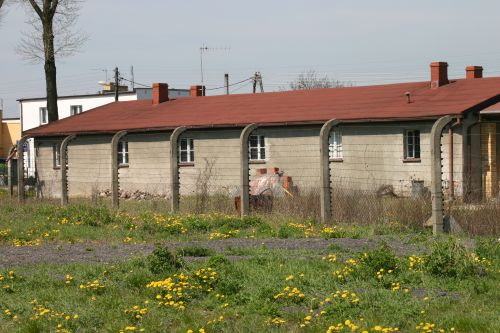Zabikowo Camp

Zabikowo Camp - May 2005(Cameron Munro)
The Nazis established a Security Police and Educational Labour Camp in Zabikowo, near Poznan (Posen) in April 1943. This camp was an extension to the Fort V11 camp in Posen. When the Fort Vii camp was closed down on April 27, 1944, 750 prisoners, the camp commandant Reinhold Hans Walter, and his SS staff of between 80 and 100 moved to Zabikowo.
The camp of 3.75 hectares area was established on the area of a former brick-yard and came under the control of the Gestapo based in Posen. The camp was surrounded with double rows of barbed-wire fencing, which was high-voltage, and guarded by watch-towers. Additionally, between the fencing some dense wire reels were placed, to help with preventing escape attempts.
From the street side, a high wall was constructed, to enhance security. The camp was divided into men's and women's and political and criminal prisoners were also separated. The Security Police prison was a place of temporary isolation, and the conditions closely resembled those at a concentration camp. The prisoners incarcerated there were held from several days, to several months. They were often moved to other camps, and release from this facility were extremely rare. From Zabikowo twenty-eight transports were sent to concentration camps. The first transport was directed to the Auschwitz Concentration Camp, and others were sent to camps at Gross-Rosen, Mauthausen, Sachsenhausen and Ravensbruck.
People were arrested and sent to Zabikowo resulting from Gestapo activity for hostile activity against the German Reich, for the German Security Services, the camp served as a place to hold arrested people, during investigations and interrogations. Prisoners were also incarcerated in Zabikowo awaiting sentencing and executions.
The prisoners were held in wooden barracks, some of which remained after the liquidation of a former forced labour camp for Jews, the Reichsautobahnlager Poggenburg, which was established during 1940, working on the construction of a motorway. The camp was designed mainly to hold Polish citizens, however Soviet Prisoners of War, and fugitives from forced labour. Also held captive were German deserters from the Wehrmacht, and civilians from a number of other countries. A separate group included the so-called 'Sunday Prisoners,' sent to Zabikowo, as a result of denunciations. They were imprisoned in the camp on Friday nights, and released on Monday mornings, having suffered all the usual torments.
In Zabikowo Polish soldiers of the Poznan and Pomerania Divisions of the Polish Home Army were shot, a total number of 1500 members of the organisation were held here, as well as members from the National Military Organisation and Independent Poland, and also members of the Szare Szeregi and the Polish Workers Party. Bodies of those killed were transported to Posen, and burned in the Collegium Anatomicum crematory. Based on the death certificates drawn up by the Germans in the registrar's office, 290 names of the people who died or were murdered in Zabikowo were found. Bodies of the deceased were sent to the crematory without providing the actual reason of the death.
Confirming the precise number of prisoners who passed through the camp in Zabikowo, is rather difficult, as the Germans destroyed much of the documentation. The number of prisoners named registered by January 19, 1945, amounted to 21,624.
The evacuation of the Zabikowo camp began at night on January 20, 1945. The first group of prisoners, some 408 of them were sent to the Sachsenhausen Concentration Camp. During the evacuation the camp was set on fire. The Germans burned the bodies of prisoners who had been shot. Other prisoners, some 208 were forced to march to Sachsenhausen Concentration Camp. Women political prisoners were sent on a death -march to Ravensbruck Concentration Camp, those who could not keep up were killed on the spot.
The final murder of prisoners in Zabikowo, occurred when 33 people from the Makow Podhalanski environs, were shot by the SS at the Zabikowo cemetery. On the afternoon of January 26, 1945, Russian troops of the 2nd Byelorussian Front entered Zabikowo and liberated it from German occupation.
Sources
Martyr's Museum in Zabikowo
Thanks to Marcin Krzyszlon
Photograph: Cameron Munro
© Holocaust Historical Society February 5 2022

